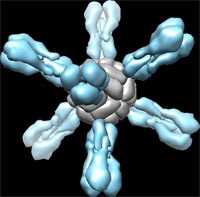 |
| Ferritin (gray) fused with the influenza protein hemagglutinin (blue)--Courtesy of NIAID |
Scientists may be one step closer to producing a universal influenza vaccine--a major advancement that could have broad implications for public health around the globe.
A team at NIH's National Institute of Allergy and Infectious Diseases has developed a new approach for immunizing against the flu that elicits a more potent immune response and greater protection than that of currently available flu vaccines.
Researchers created an experimental vaccine by genetically fusing the protein ferritin, which has the ability to self-assemble into nanoparticles, with another protein, hemagglutinin, found on the surface of the influenza virus. Specifically, the scientists used hemagglutinin from a 1999 strain of H1N1 flu virus. The vaccine works by stimulating antibodies that attach to the parts of the influenza virus that are the same across different strains.
A single dose of the vaccine both with and without an adjuvant triggered an immune response in mice, while two doses of the currently licensed seasonal influenza vaccine were necessary to produce the same effect. The vaccine also protected against a wider range of H1N1 flu strains in mice than do current vaccines.
In ferrets, the vaccine was tested to see how it would guard against a 2007 strain of H1N1 flu virus--a strain that the experimental vaccine was not specifically designed to prevent. One day after being given the HA-ferritin nanoparticle vaccine, the animals had notably lower influenza virus levels than those that did not receive the vaccine.
Each year, new flu vaccines must be designed and rapidly produced to keep up with viruses in circulation, but unexpected strains can often emerge from both animals and humans. Finding a universal flu vaccine could help lessen the burden of the disease on health systems and provide the groundwork for building better and more widespread vaccine protection among the public. A universal flu vaccine could also eliminate the need for an annual vaccination.
- read FierceVaccines' take
- here's the study abstract
- read the press release